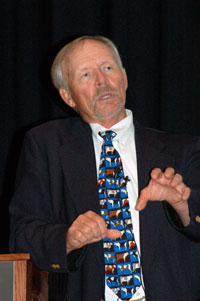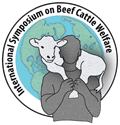Adopting Industry Guidelines for Animal Welfare
Using the same approach to cattle well-being as to beef quality assurance will allow producers to meet animal welfare goals without regulation.
MANHATTAN, Kan. (May 19, 2010) — Bob Smith emphasized the importance of adopting industry guidelines — such as Beef Quality Assurance (BQA) practices — through the entire beef production chain as he addressed participants of the International Symposium on Beef Cattle Welfare May 19. Smith, who is a veterinarian based in Stillwater, Okla., works in private practice with five other veterinarians at Veterinary Research and Consulting Services. The group works with feedlot and stocker cattle clients across the High Plains.

Producers can solve problems without regulation, Bob Smith says, but to do so they need the problems identified and proper education and training as to how to eliminate those problems.
Smith has also been active in cattle and veterinary organizations, including the BQA Advisory Board; chairing the National Cattlemen's Beef Association (NCBA) Cattle Health and Well-being Committee; and serving as president of the American Association of Bovine Practitioners, the Academy of Veterinary Consultants and, currently, the Western Veterinary Conference.
Smith reminded attendees that one of the core BQA values is the belief that production practices affect consumer acceptance of beef. He added, “Producers can make a difference in the beef that is produced by taking responsibility and working together.”
He shared how in the past through BQA and the Beef Quality Audits, injection-site lesions were identified as an industry problem. Then, through education, the incidence of these lesions was reduced from over 20% to 2%.
“This tells us producers can solve problems without regulation as long as the problems are identified and education and training is provided,” he said.
In advancing animal welfare efforts throughout the beef industry today, Smith credited the industry with building on BQA principles and more recently developing the Cattle Care and Handling Guidelines to set standards for animal care from nutrition, feeding and health to cattle handling and euthanasia, and the BQA Feedyard Self Assessment Guidelines to conduct self- or third-party audits evaluating safety, quality, environmental and animal welfare practices.
Smith called programs such as these “proactive” efforts by the industry. “This is being proactive and trying to stay ahead of the game.”
Particularly of the self-assessment guidelines that can be used for audits, Smith said he is hopeful these become the accepted audit format by all interested parties, and he shared that similar guidelines for self- or third-party audits are being developed by the industry for cow-calf and stocker operations — again so that a proactive role is taken.
Smith credited the newly instituted Masters of Beef Advocacy program as another proactive means to educate people working in the beef industry and in turn helping them better inform consumers about their stewardship and animal care efforts.
In his closing remarks, Smith reiterated the importance of character throughout the industry, saying, “Character is what you do when no one else is looking. … If you are going to do things right, you don’t just do it at the audit. We should do things right all the time, and then you don’t have to worry about an audit or the media showing your cattle operation on the 6 o’clock news.”
The beef cattle welfare symposium was conducted on campus at K-State University May 19-21. For additional presentation summaries, return to the Meetings > Other Industry Meetings > News Coverage page of the API Virtual Library. For more about the symposium and an archive to the 2008 symposium, visit www.isbcw.beefcattleinstitute.org.
Editor's Note: This article was written under contract or by staff of Angus Productions Inc. (API), which claims copyright to this article. It may not be published or distributed without the express permission of API. To request reprint permission and guidelines, contact Shauna Rose Hermel, editor, at 816-383-5270.

